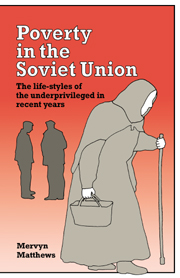Preface
Published online by Cambridge University Press: 30 October 2009
Summary
In recent years poverty in the industrialised nations of the world has attracted considerable interest. The problem has become a distinct branch of academic research, using most of the social disciplines to investigate cause and effect. All the more striking, therefore, is the fact that the study of poverty in the Soviet Union should have been relatively neglected. The problems of poor people in that vast land have received far less attention than they deserve.
The reasons for this are fairly straightforward. Public discussion of poverty as such is virtually banned in the USSR itself, and even specialist Soviet writers cannot easily broach it. The Soviet Union claims for itself exemplary social development, and outside observers have perhaps been a little too ready to believe that Soviet reality bears little blemish of this kind. Travel and residence restrictions on foreigners mean that the poor are relatively inaccessible for purposes of observation anyway. Constant Soviet propaganda about rising living standards, not to mention some hefty improvements in real terms, have tended to deflect attention to other topics.
In any case, the sociological disciplines as practised in the West have, in our view, underperformed in this particular sphere. Political scientists find little of interest in a social group which is excluded from the power game, and has little measurable impact on matters of governance. Economists seem to concentrate on macrodevelopment and mean values. Their work in any case has been inhibited by the highly unsatisfactory nature of Soviet income statistics, and the imponderables of the ‘second’ economy.
Information
- Type
- Chapter
- Information
- Poverty in the Soviet UnionThe life-styles of the underprivileged in recent years, pp. xi - xviPublisher: Cambridge University PressPrint publication year: 1986
